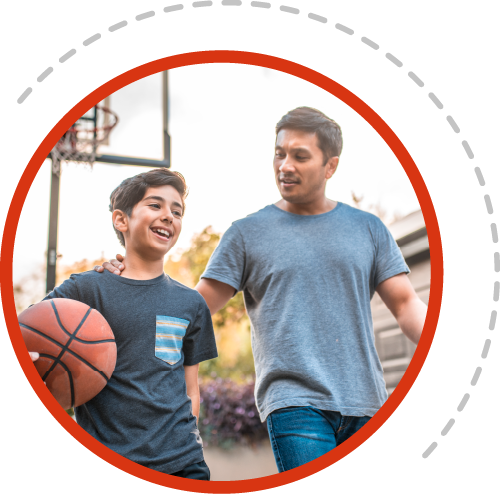What a pain…
another migraine!
Is your/your child’s life impacted by migraine?
If so, you/they may be eligible to participate in a clinical study that may help reduce migraines.

ABOUT THE PROSPECT-1 STUDY
The goal is to see if the investigational study medicine can minimize the number of headache days you/your child or loved one has.
WHO CAN QUALIFY?
You/your child may be able to participate if you/they are between 6 and 17 years old and have a diagnosis of migraine for at least 6 months.

STUDY LOCATIONS
The PROSPECT-1 study will take place at several clinical sites in different countries around the world. Click here to view our map and find a site location near you.
Fill out the form below
to see if you/your child qualifies for the PROSPECT-1 Study
If you are under the age of 18, you may not directly enter any information and your legal parent or guardian must enter this information on your behalf. By filling out this form, you are confirming that you meet these requirements.
"*" indicates required fields
Who is eligible?
You/YOUR child may qualify if you/they:
- Are between the ages of 6 and 17
- Have been diagnosed with migraine for at least 6 months before starting the study
- Have at least 4 migraine headaches per month
There are additional eligibility requirements to participate.
A PROSPECT-1 study representative can discuss them with you.
What Is Migraine?
Migraine is a common condition associated with moderate to severe headaches.
Symptoms and Stats
Children also may experience different symptoms of migraine than adults. A common indication of migraine in adults is one-sided (unilateral) head pain, whereas children and teens usually experience pain on both sides of the head (bilateral). Other symptoms of migraine in children and adolescents include:
- Sensitivity to light and sound
- Dizziness, lightheadedness, blurred vision
- Usually shorter duration than adult migraine headaches
- In younger children, gastrointestinal symptoms such as vomiting, loss of appetite, and stomach pain are common and often overlooked in relation to migraine
Causes of Migraine
If there is a family history of migraine, there is a 50-75% risk that a child will also experience migraine1. In addition to genetics, there are also external triggers than can cause headaches. These include stress, not sleeping enough, extended time in front of screens, certain foods, and even weather conditions1.
Long Term Effects of Migraine
Dealing with multiple headache days per month can be exhausting for children and teens, negatively affecting their quality of life. In addition to missing school, the pain can cause long-term effects such as depression, anxiety, and other mental health disorders. Identifying and treating migraine before causing long-term effects can help give your child a better quality of life.
Parent Experience
“It’s heartbreaking, feeling like you’ve exhausted all options of helping your daughter through a migraine. Trying to ease her pain and figure out why she is having them so frequently is all I worry about. Seeing the pain and tears in her eyes, her hands holding her head and her pleading for me to help it stop is a moment I’ll forever remember. I felt like I could’ve done more but I knew I had tried everything to keep her comfortable until it passed.”



ABOUT THE STUDY
Eptinezumab has been approved by the U.S. Food and Drug Administration (U.S. FDA) and the European Medicines Agency (EMA) for the preventative treatment of migraine in adults, but has not been approved for use in children and teens. This study aims to enroll participants worldwide. The study will last around 24 weeks with an invitation to extend study treatment to one year in total.
What Will Happen During This Study?
Participants will be randomly assigned to receive one dose of the study medicine or placebo. All participants will be placed in one of three groups, with a two in three chance of receiving the study medicine. Using placebo is often required in clinical studies to scientifically compare and prove that the study medicine works. Neither you nor the study staff will know if you/your child is receiving the study medicine or placebo, but in the event of a medical emergency, the study doctor will be able to find out which group you/your child belongs to.
The study consists of a 4-week screening period, a 12-week study treatment period where you/your child will receive a single dose of either the study medicine or placebo, and an 8-week safety follow-up period. At the end of the treatment period, you/your child may qualify to enroll in the open-label extension study, called REJOIN, where everyone receives up to 3 doses of eptinezumab, 12 weeks (3 months) apart. There is also a chance that you/your child may continue taking their preventative migraine medication during the treatment period. For more information, please speak with the study staff directly.
During the screening and treatment periods, you and/or your child will have to complete a daily electronic diary (eDiary) to report headache symptoms, severity, and the use of other medication to help with pain. Children aged 6-11 will complete the eDiary with a parent/caregiver, while adolescents aged 12-17 will complete the eDiary on their own.
COMMON QUESTIONS
What is a clinical research study?
A clinical research study tests the safety and efficacy of an investigational medication in human volunteers. Every new investigational medication goes through the clinical study process. Therefore, study participants play a very important role in advancing medicine for present and future generations.
What is the investigational medication being researched in this study?
What is a placebo?
Is this a brand-new medicine?
No, eptinezumab has already been approved for use in adults in both the USA and EU. Children can be affected by diseases and medicines differently than adults, which means that researchers need to perform clinical studies to determine how treatments, medications, and devices work in their bodies. This helps develop child-appropriate medications and figure out which doses are the safest for each age group.
Is study participation voluntary?
To help protect your/your child’s health and safety, the study will be supervised by a study doctor and their trained team. You may need to share information on your/your child’s current and past health during the screening period and at clinic visits.
If you have a family doctor, it is strongly recommended that you inform them of your interest in this study.
Study Locations
If you are interested in having your child participate in the PROSPECT-1 study, complete the form above to speak with a study representative who can also provide available study locations.
I want to learn more!
Where Should I Go?
You may also fill out the form above and a study representative can contact you to discuss study requirements, study locations, and more.
Help spread awareness of the PROSPECT-1 study by sharing with others!
To share this study information via email, click here.

